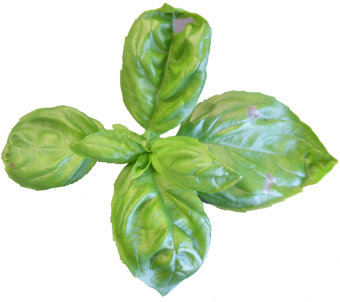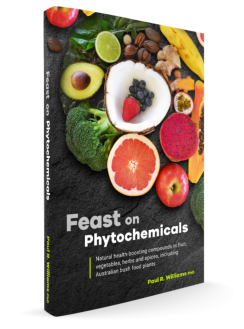Growing phytochemicals
Cultivation techniques can be refined to enhance the concentration of health-promoting phytochemicals in fruit, vegetables, herbs and spices.
Plants are expert chemists
They manufacture phytochemicals with antioxidant properties, especially in times of stress such as hot, dry days. For example, plants accumulate flavonoids, such as luteolin and quercetin, in their leaves to provide antioxidant protection from free radical damage formed under intense sunlight (Agati et al. 2009). These same phytochemicals, luteolin and quercetin, provide antioxidant benefits to us when we consume plants. The flavonoids in tea that are so beneficial to people have a role as antioxidants in the leaves of tea plants, protecting them damage during high light intensity (Zhang et al. 2017). Plants make other phytochemicals to deter insect attack or kill bacteria and fungi. For example, resveratrol found in red wine protects grapes from fungal attack (Jeandet et al. 2014).

The quality is in the growing
How plants are grown affects the concentration of phytochemicals. Cultivation techniques can be refined to enhance the concentration of health-promoting phytochemicals in fruit, vegetables, herbs and spices. For example, a ten-year trial found that organically grown tomatoes produced with good soil organic matter contained significantly higher levels of several flavonoids, especially quercetin, than tomatoes grown conventionally with artificial fertilisers and pesticides (Mitchell et al. 2007). Numerous studies also indicate that plants grown with mycorrhizal fungi, typically present in soils with high levels of organic matter, increase their phytochemical production.
Nature does it best
Overall, it appears that pampering plants with abundant watering, pesticides and nitrogen fertilisers tends to lower the concentration of many health-promoting phytochemicals. This makes sense as many phytochemicals are produced by plants in response to insect attack and stressful growing conditions. Growing plants in healthy soil with good organic matter and microbes such mycorrhizal fungi tends to increase phytochemical production.
Find out more…
This site is dedicated to improving our understanding of phytochemicals, especially their capacity to contribute to our long term health… Read more
Phytochemicals are typically grouped into the following broad categories, with many vitamins (such as vitamin C) also considered phytochemicals… Read more
The phytochemicals in the plants we eat provide important health benefits through their antioxidant and anti-inflammatory properties… Read more
Australia is home to a huge diversity of significant plants and has ancient biological links with Africa, India and South America, and… Read more
Buy the Book
$30.00 + P&H
This book brings the science of plant compounds to people interested in healthy eating and nutrition. It interprets the latest scientific research about health promoting phytochemicals that are supplied to us in common fruit and vegetables (including nuts, legumes and whole grains), herbs and spice.


